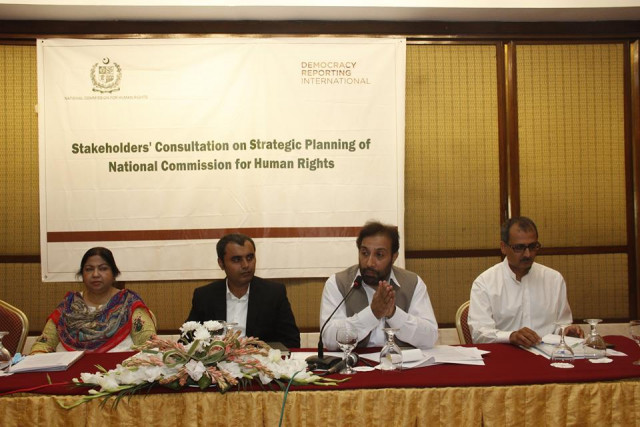National rights commission observing CII statement
NCHR member says it will oppose CII statements that could affect women’s rights

NCHR member says it will oppose CII statements that could affect women’s rights. PHOTO: ONLINE
This was announced by NCHR member Chaudhry Muhammad Shafique on Friday. He was speaking at a stakeholders’ consultation on the strategic planning for the NCHR.
Earlier, several participants from the civil society including lawyers and journalists said that some of the CII’s recent recommendations could have a detrimental impact on the state of women’s rights.
The purpose of the workshop held in collaboration with the Democracy Reporting International (DRI) was to seek recommendations for devising a future course of action for the commission.
The participants were divided in three groups.
The group led by Advocate Asad Jamal suggested that the NCHR should review the juvenile justice system of the country to ensure that there were no provisions that violated juvenile rights. The group also recommended review of the Anti-Terrorism Act, saying that the law could be abused to prevent people from exercising their constitutionally guaranteed right to assembly. It said that it should be ensured that the ongoing action against terrorism did not violate the rights of the citizens. It expressed reservations over clauses in the ATA under which suspects could be detained for up to 90 days or tried at military court lacking due process.
Other suggestions of the group were promotion of research on cases of capital punishment for possible miscarriage of justice; amendments in Sections 14 and 15 of the National Commission for Human Rights Act 2012 to empower the NCHR to hold Armed Forces personnel accountable for violations of human rights; and review of the education curricula to check for hate material.
The second group led by rights activist Najamudin suggested that the NCHR should monitor jails and police lockups to prevent incidents of torture and humiliation of detainees. It said the commission should have regular meetings with departments and state institutions like the offices of the ombudsperson and the Commission on Status of Women to ensure promotion of human rights.
The group said the commission should set up regional offices in all provinces and work in collaboration with civil society organisations. It also sought the setting up of a free hotline where citizens could lodge complaints about violation of rights.
The third group was led by Peter Jacob. Its suggestions included promotion of work to stop incidents of torture and violence against marginalised groups like women and minorities; enforcement of a right to education and physical security and raising awareness among the masses about various human rights. The group asked the commission to ensure that its input was considered by ministries concerned at relevant international forums.
In his concluding remarks, Chaudhry Shafiq said the commission had already initiated a discussion on the terrorism laws. On the need for amendments in Section 14 and 15 of the NCHR Act of 2012, he said the law was already quite powerful compared to similar laws in many other countries. He said it allowed the commission to ask the government about violations of rights by armed forces’ personnel. He said a similar law in India did not contain this provision. He said discussion was also underway on ways to prevent misuse of Qisas and Diyat laws.
Published in The Express Tribune, June 25th, 2016.



















COMMENTS
Comments are moderated and generally will be posted if they are on-topic and not abusive.
For more information, please see our Comments FAQ